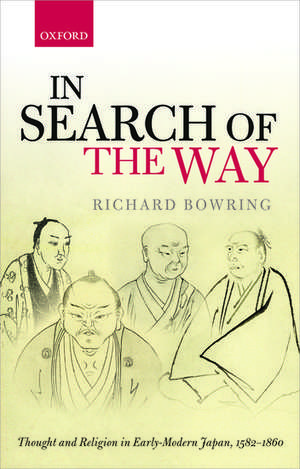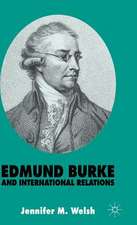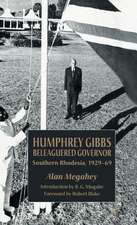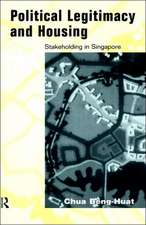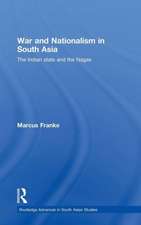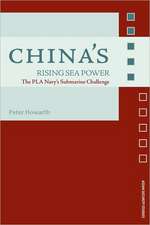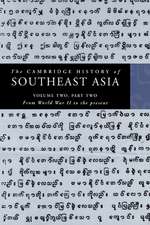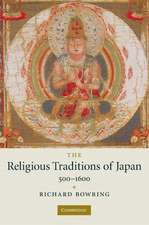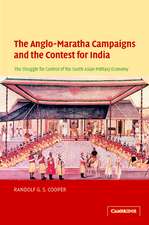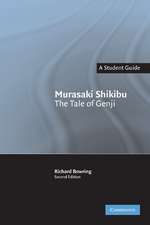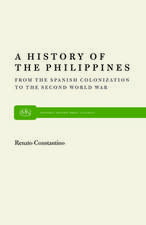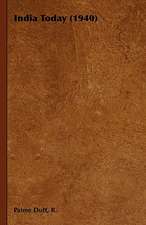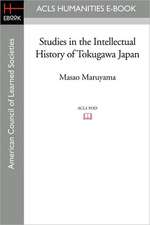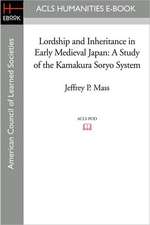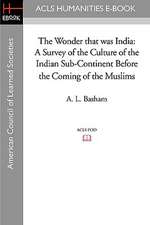In Search of the Way: Thought and Religion in Early-Modern Japan, 1582-1860
Autor Richard Bowringen Limba Engleză Hardback – 30 noi 2016
Preț: 776.65 lei
Preț vechi: 1114.61 lei
-30% Nou
Puncte Express: 1165
Preț estimativ în valută:
148.63€ • 161.39$ • 124.85£
148.63€ • 161.39$ • 124.85£
Carte tipărită la comandă
Livrare economică 11-17 aprilie
Preluare comenzi: 021 569.72.76
Specificații
ISBN-13: 9780198795230
ISBN-10: 0198795238
Pagini: 346
Dimensiuni: 165 x 240 x 24 mm
Greutate: 0.68 kg
Editura: OUP OXFORD
Colecția OUP Oxford
Locul publicării:Oxford, United Kingdom
ISBN-10: 0198795238
Pagini: 346
Dimensiuni: 165 x 240 x 24 mm
Greutate: 0.68 kg
Editura: OUP OXFORD
Colecția OUP Oxford
Locul publicării:Oxford, United Kingdom
Recenzii
The book is eminently readable, packed with useful and interesting information vis-à-vis the ever-shifting religious scenery of the intellectually vibrant times of Tokugawa Japan; recommended reading to all.
recommended reading to all.
Richard Bowring's summa will surely help many of us, scholars and students alike, to navigate through all these different "Ways" without losing our heads.
[The book] provides an excellent introduction for students who want to orientate themselves in this field. For the specialist, too, it contains a number of ideas, comments, and hints that could serve as points of departure for future research. The book also contains a great many quotations from the original sources.
The erudition and precision of Bowring's scholarship in this volume is exemplary. There are few volumes (if any) in English which give such a broad, yet detailed, overview of the ideas of major thinkers of early modern Japan. As a reference work in English for those wanting to understand or study early modern Japanese intellectual history, this volume is therefore invaluable.
One of the most impressive contributions of this work is its treatment of the intersections of Shinto-based and Sung Confucian-based idea structures. Bowring brings new insights into the roles of Hayashi Razan and Fujiwara Seika, at the outset of this period, and Aizawa Seishisai towards its conclusion (and numerous others throughout the work), as he demonstrates with great acumen and perspicacity the "intellectual gymnastics" (p. 306) needed to draw these clearly distinct thought structures together.
While there have been works published since then that would qualify as such, Bowring's volume is the latest, and perhaps the best, among them so far... His narrative style is lucid, and he provides sometimes rather detailed historical backgrounds for the ideas and figures he examines.
Bowring delivers on what he promises to do in his book and showcases the vitality of Tokugawa intellectual and religious history. The conceptual lens of the "Way" works effectively and allows a variety of voices to be introduced with a certain sense of coherence. Most importantly, Bowring's book is an invaluable testament to the importance of taking Tokugawa religion and intellectual history seriously and on their own terms.
Professor Bowring's book is packed with information and insight, and will be revisited again and again by those who want to understand Japanese intellectual tradition.
recommended reading to all.
Richard Bowring's summa will surely help many of us, scholars and students alike, to navigate through all these different "Ways" without losing our heads.
[The book] provides an excellent introduction for students who want to orientate themselves in this field. For the specialist, too, it contains a number of ideas, comments, and hints that could serve as points of departure for future research. The book also contains a great many quotations from the original sources.
The erudition and precision of Bowring's scholarship in this volume is exemplary. There are few volumes (if any) in English which give such a broad, yet detailed, overview of the ideas of major thinkers of early modern Japan. As a reference work in English for those wanting to understand or study early modern Japanese intellectual history, this volume is therefore invaluable.
One of the most impressive contributions of this work is its treatment of the intersections of Shinto-based and Sung Confucian-based idea structures. Bowring brings new insights into the roles of Hayashi Razan and Fujiwara Seika, at the outset of this period, and Aizawa Seishisai towards its conclusion (and numerous others throughout the work), as he demonstrates with great acumen and perspicacity the "intellectual gymnastics" (p. 306) needed to draw these clearly distinct thought structures together.
While there have been works published since then that would qualify as such, Bowring's volume is the latest, and perhaps the best, among them so far... His narrative style is lucid, and he provides sometimes rather detailed historical backgrounds for the ideas and figures he examines.
Bowring delivers on what he promises to do in his book and showcases the vitality of Tokugawa intellectual and religious history. The conceptual lens of the "Way" works effectively and allows a variety of voices to be introduced with a certain sense of coherence. Most importantly, Bowring's book is an invaluable testament to the importance of taking Tokugawa religion and intellectual history seriously and on their own terms.
Professor Bowring's book is packed with information and insight, and will be revisited again and again by those who want to understand Japanese intellectual tradition.
Notă biografică
Richard Bowring graduated from the University of Cambridge with first class honours in Japanese in 1968, and a PhD in 1973. He has taught at Monash University, Columbia University, Princeton University, and the University of Cambridge, taking retirement in 2013. He was made an Honorary Fellow of Downing College, Cambridge in 2013, and was awarded the Order of the Rising Sun, Gold Rays with Neck Ribbon by the Japanese Government in 2013.
